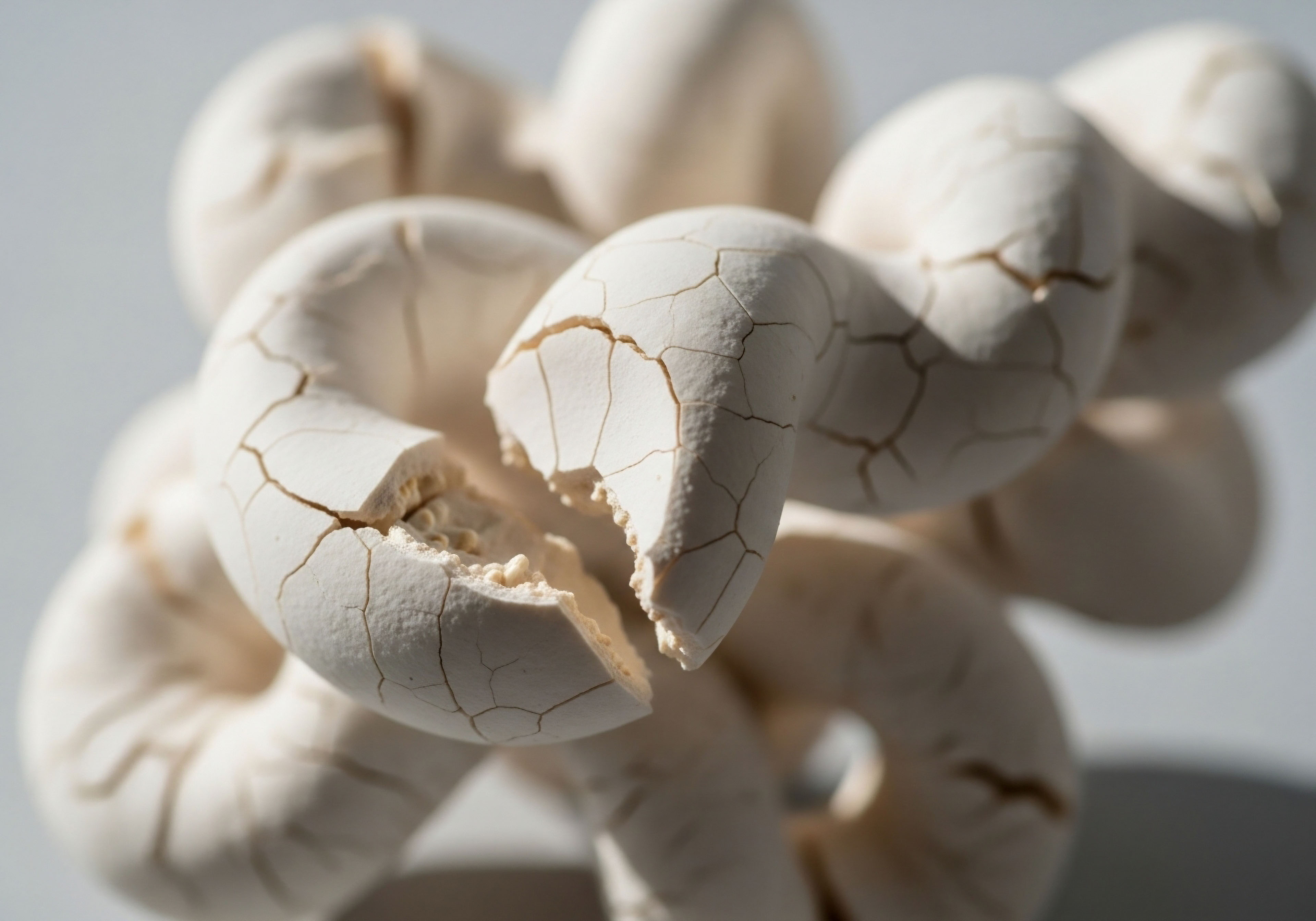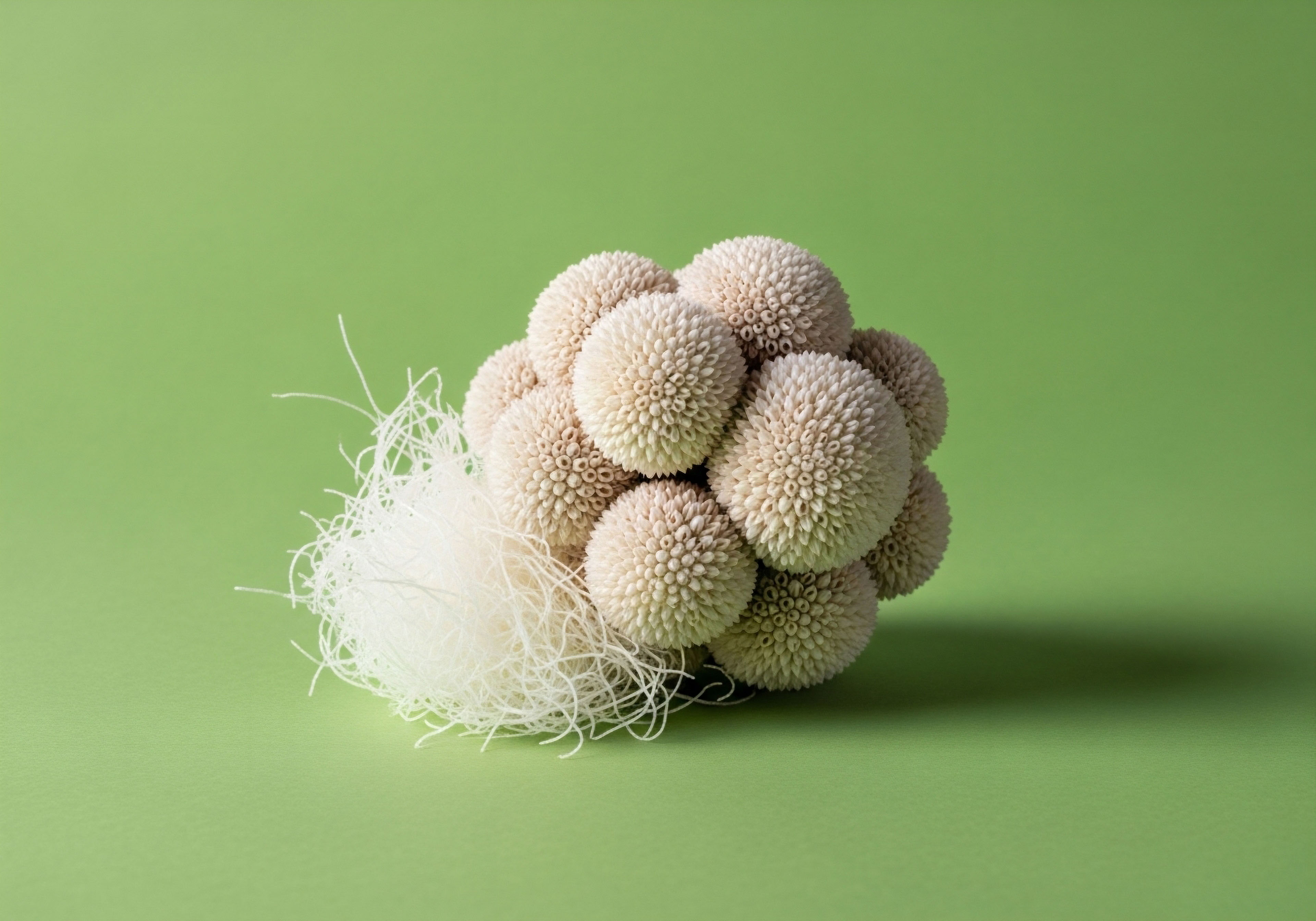

Fundamentals
Have you ever found yourself navigating through daily life with a persistent sense of unease, a diminished drive, or a pervasive mental fog that seems to cloud your once clear perspective? Many individuals experience a subtle yet profound shift in their inner landscape, a feeling that their vitality has somehow receded, leaving them less engaged with the world around them.
This internal experience, often dismissed as simply “getting older” or “stress,” frequently signals a deeper biological recalibration occurring within the body’s intricate messaging systems. Understanding these shifts, particularly within the endocrine system, is the initial step toward reclaiming a sense of well-being and function.
The human body operates through a complex network of chemical communicators, known as hormones. These powerful molecules act as internal messengers, orchestrating countless physiological processes, from metabolism and growth to reproduction and, critically, mood regulation. When these messengers are out of balance, the effects can ripple throughout your entire system, influencing how you think, feel, and interact with your environment.

The Role of Testosterone in Male Physiology
Among these vital chemical communicators, testosterone holds a central position in male physiology. While widely recognized for its influence on muscle mass, bone density, and sexual function, its impact extends significantly into the realm of mental and emotional health. Testosterone is not solely a physical hormone; it is a neuroactive steroid, meaning it directly influences brain function and neural pathways. This direct interaction helps shape a man’s energy levels, cognitive clarity, and emotional resilience.
Testosterone, a key male hormone, significantly influences not only physical attributes but also mental and emotional well-being.
When testosterone levels decline, whether due to the natural aging process, certain medical conditions, or lifestyle factors, a cascade of symptoms can manifest. This condition, known as hypogonadism or low testosterone, often presents with a range of non-specific complaints that can be easily misattributed. These symptoms extend beyond physical changes, frequently affecting a man’s psychological state.

Recognizing the Signs of Hormonal Imbalance
Many men experiencing hypogonadism report a noticeable decrease in their overall sense of well-being. They might describe feelings of sadness, increased irritability, or a general lack of motivation. Physical manifestations often include persistent tiredness, reduced physical energy, and a decline in sexual interest. These subjective experiences are not merely psychological; they are often direct reflections of underlying biochemical shifts. The body’s internal thermostat, which regulates hormonal output, may be signaling a need for attention.
Consider the analogy of a finely tuned orchestra. Each section, each instrument, must play in harmony for the music to sound complete and vibrant. Hormones function similarly within the body. When one section, such as testosterone production, begins to play out of tune, the entire symphony of bodily functions can be affected, leading to a disharmonious experience of health. Recognizing these early signs and understanding their potential hormonal roots is a proactive step toward restoring that internal harmony.


Intermediate
The question of whether testosterone replacement therapy benefits mood in all men requires a careful examination of clinical protocols and the intricate ways these interventions interact with the body’s systems. While the foundational understanding of testosterone’s role is crucial, exploring the specifics of hormonal optimization protocols reveals why responses can vary among individuals.

Testosterone Replacement Therapy Protocols for Men
For men experiencing symptoms of low testosterone, a common approach involves a comprehensive hormonal optimization protocol. This is not a one-size-fits-all solution but a tailored strategy designed to restore physiological balance. A standard protocol often includes weekly intramuscular injections of Testosterone Cypionate, typically at a concentration of 200mg/ml. This form of testosterone provides a steady release into the bloodstream, helping to maintain stable levels.
Beyond the direct administration of testosterone, a holistic protocol frequently incorporates additional medications to manage the body’s natural feedback mechanisms and mitigate potential side effects. These include ∞
- Gonadorelin ∞ Administered via subcutaneous injections, often twice weekly. This peptide acts on the hypothalamus to stimulate the pituitary gland, encouraging the continued production of luteinizing hormone (LH) and follicle-stimulating hormone (FSH). This helps maintain endogenous testosterone production and supports testicular function, which is particularly important for preserving fertility.
- Anastrozole ∞ An oral tablet taken, for example, twice weekly. This medication is an aromatase inhibitor, meaning it blocks the conversion of testosterone into estrogen. While estrogen is essential in men, excessive levels can lead to undesirable effects such as gynecomastia or mood fluctuations. Managing estrogen levels is a critical component of optimizing the overall hormonal environment.
- Enclomiphene ∞ This medication may be included to further support LH and FSH levels, especially in men where maintaining natural testosterone production is a primary concern. It works by blocking estrogen receptors in the pituitary, signaling the body to produce more gonadotropins.
Comprehensive testosterone optimization protocols extend beyond testosterone administration, incorporating agents to maintain natural production and balance other hormones.

How Hormonal Balance Influences Mood
The impact of testosterone on mood is multifaceted, extending to various neurobiological pathways. Testosterone is a neuroactive steroid, directly influencing brain chemistry. It modulates the activity of key neurotransmitters, the brain’s chemical messengers, which play a central role in mood regulation.
For instance, testosterone influences the production and signaling of serotonin and dopamine. Serotonin is widely recognized for its role in feelings of well-being and happiness, while dopamine is associated with motivation, reward, and pleasure. When testosterone levels are suboptimal, the delicate balance of these neurotransmitters can be disrupted, potentially contributing to symptoms such as low mood, reduced motivation, and anhedonia.
Moreover, testosterone interacts with the body’s stress response system. It helps buffer the effects of cortisol, the primary stress hormone. In situations of chronic stress, elevated cortisol levels can suppress testosterone production, creating a cyclical relationship where stress exacerbates hormonal imbalance, and hormonal imbalance amplifies the physiological and psychological impact of stress. Restoring testosterone levels can help re-establish a more resilient stress response, contributing to improved emotional stability.

Individual Responses to Testosterone Therapy
While many men with confirmed hypogonadism report significant improvements in mood, energy, and overall well-being after initiating testosterone therapy, it is important to acknowledge that responses are not uniform. The phrase “all men” in the initial question highlights the inherent variability in human physiology.
Clinical studies have shown that the most consistent positive mood outcomes occur in men who present with both clinically low testosterone levels and mild or subsyndromal depressive symptoms. For individuals diagnosed with major depressive disorder, the evidence supporting testosterone therapy as a standalone antidepressant is less conclusive. This suggests that while hormonal balance is a critical component of overall well-being, it is one piece of a larger, intricate puzzle.
The table below summarizes some key components of a comprehensive male testosterone optimization protocol and their primary roles ∞
| Medication | Primary Role | Mechanism of Action |
|---|---|---|
| Testosterone Cypionate | Testosterone replacement | Exogenous androgen to restore physiological levels |
| Gonadorelin | Preservation of endogenous production | Stimulates GnRH receptors in the pituitary, promoting LH/FSH release |
| Anastrozole | Estrogen management | Aromatase inhibitor, reduces testosterone to estrogen conversion |
| Enclomiphene | LH/FSH support | Selective estrogen receptor modulator, stimulates gonadotropin release |


Academic
To truly comprehend whether testosterone replacement therapy benefits mood in all men, a deep exploration into the underlying endocrinology and neurobiological mechanisms is essential. This requires moving beyond surface-level observations to analyze the intricate systems biology at play, considering the interplay of various biological axes and neurotransmitter functions.

The Hypothalamic-Pituitary-Gonadal Axis and Mood Regulation
The Hypothalamic-Pituitary-Gonadal (HPG) axis represents a sophisticated neuroendocrine feedback loop that governs testosterone production and, by extension, influences mood. This axis begins in the hypothalamus, a region of the brain that secretes gonadotropin-releasing hormone (GnRH). GnRH then signals the anterior pituitary gland to release two crucial hormones ∞ luteinizing hormone (LH) and follicle-stimulating hormone (FSH). These gonadotropins travel to the testes, stimulating the Leydig cells to produce testosterone and supporting spermatogenesis.
Testosterone, in turn, exerts a negative feedback effect on both the hypothalamus and the pituitary, regulating its own production. When exogenous testosterone is introduced, as in TRT, this negative feedback can suppress the body’s natural GnRH, LH, and FSH production, leading to a reduction in endogenous testosterone synthesis and testicular atrophy. This is why comprehensive protocols often include agents like Gonadorelin or Enclomiphene, aiming to modulate this feedback and preserve aspects of natural HPG axis function.
Dysregulation of the HPG axis has been observed in men experiencing major depressive episodes. Studies indicate that men with depression often exhibit diminished testosterone levels and potentially elevated estradiol. This hormonal imbalance can contribute to mood disturbances, suggesting a direct link between HPG axis function and emotional well-being. The precise mechanisms by which this dysregulation contributes to depression are still under investigation, but they likely involve the complex interplay of hormones with neural circuits.

Neurobiological Mechanisms of Testosterone’s Influence on Mood
Testosterone’s impact on mood extends to its direct actions within the central nervous system. As a neuroactive steroid, it interacts with various brain regions and neurotransmitter systems that are fundamental to emotional processing and cognitive function.
One significant pathway involves the modulation of neurotransmitters. Testosterone has been shown to influence the levels and activity of serotonin, dopamine, and gamma-aminobutyric acid (GABA). Serotonin, a key regulator of mood, sleep, and appetite, can be directly affected by testosterone levels. Dopamine, associated with reward, motivation, and pleasure, also sees its signaling modulated by testosterone.
GABA, the primary inhibitory neurotransmitter, plays a role in reducing neuronal excitability and promoting calmness. Alterations in these neurotransmitter systems due to low testosterone can contribute to symptoms such as anhedonia, irritability, and anxiety.
Beyond neurotransmitter modulation, testosterone is considered to possess neuroprotective properties. It may promote neurogenesis, the creation of new neurons, particularly in areas like the hippocampus, a brain region critical for memory, learning, and emotional regulation. Chronic stress, often linked to depression, can lead to hippocampal volume reduction and impaired neurogenesis. By supporting neuroplasticity and protecting neuronal health, testosterone may contribute to greater resilience against stress-induced mood disturbances.
Furthermore, testosterone can influence the body’s inflammatory response. Chronic low-grade inflammation is increasingly recognized as a contributing factor to mood disorders. Testosterone may exert anti-inflammatory effects, potentially mitigating neuroinflammation that could otherwise impair brain function and mood.

Clinical Evidence and Variability in Response
Clinical trials and meta-analyses investigating the relationship between testosterone replacement therapy and mood outcomes present a complex picture. While some studies demonstrate clear benefits, others show more modest or inconsistent results.
- Positive Outcomes in Hypogonadal Men ∞ Several studies indicate that TRT significantly improves positive mood parameters, such as energy, feelings of well-being, and friendliness, while decreasing negative mood parameters like anger, irritability, sadness, and nervousness in men with diagnosed hypogonadism. These improvements are often observed in men with low baseline testosterone levels and mild depressive symptoms.
- Mixed Results in Major Depressive Disorder ∞ For men with major depressive disorder (MDD), the evidence is less robust. Some systematic reviews and meta-analyses suggest that while TRT may alleviate depressive symptoms in certain subpopulations (e.g. men with dysthymic disorder, HIV, or treatment-resistant depression), it is not consistently effective as a standalone treatment for MDD. This suggests that depression is a multifactorial condition, and hormonal imbalance is one of many potential contributors.
- The Role of Baseline Testosterone ∞ The initial testosterone level appears to be a significant predictor of response. Men with lower baseline testosterone levels tend to experience more pronounced mood improvements with TRT compared to eugonadal men. This reinforces the concept that TRT is a replacement therapy for a deficiency, not a general mood enhancer for all.
Consider the implications of these findings. The effectiveness of TRT on mood is not a universal phenomenon. It is highly dependent on the individual’s baseline hormonal status, the specific nature and severity of their mood disturbance, and the presence of other contributing factors. A man experiencing low mood primarily due to a significant testosterone deficiency is more likely to experience a positive shift with TRT than a man whose depression stems from complex psychological trauma or other severe medical conditions.
Testosterone’s mood benefits are most consistent in men with diagnosed low levels and mild depressive symptoms, highlighting the importance of individualized assessment.

Interconnectedness with Metabolic Health
The endocrine system does not operate in isolation. Testosterone status is intimately linked with metabolic health, and these interconnections can further influence mood. For example, low testosterone is often associated with increased visceral fat mass, insulin resistance, and an elevated risk of type 2 diabetes. These metabolic dysregulations can independently contribute to systemic inflammation and oxidative stress, both of which are implicated in the pathophysiology of mood disorders.
By optimizing testosterone levels, TRT can sometimes lead to improvements in body composition and insulin sensitivity, thereby reducing metabolic burden. This systemic improvement can indirectly support better mood regulation by reducing inflammatory signals and improving overall cellular function. The body’s systems are in constant communication; a positive change in one area, such as hormonal balance, can ripple through others, creating a more favorable environment for mental well-being.

Does Testosterone Replacement Therapy Benefit Mood in All Men?
The answer to this question is complex and requires a nuanced understanding of individual physiology and the multifactorial nature of mood. While testosterone replacement therapy can significantly improve mood parameters in many men, particularly those with clinically diagnosed hypogonadism and associated depressive symptoms, it is not a universal panacea for all mood disturbances.
The efficacy is most pronounced when a clear hormonal deficiency is present and contributing to the symptoms. For men with severe depression or other primary mental health conditions, TRT may serve as an adjunctive therapy, but it is rarely a standalone solution. A comprehensive assessment, considering the entire biological system and individual circumstances, remains paramount.

References
- Wang, C. et al. “Testosterone replacement therapy improves mood in hypogonadal men–a clinical research center study.” The Journal of Clinical Endocrinology & Metabolism, vol. 85, no. 9, 2000, pp. 3031-3037.
- Khera, M. “Testosterone and Mental Health.” Translational Andrology and Urology, vol. 2, no. 4, 2013, pp. 178-183.
- Snyder, P. J. et al. “Effects of Testosterone Treatment in Older Men.” The New England Journal of Medicine, vol. 371, no. 11, 2014, pp. 1014-1024.
- Huo, S. et al. “Treatment of Men for “Low Testosterone” ∞ A Systematic Review.” PLOS One, vol. 11, no. 9, 2016, e0162480.
- Walther, A. et al. “Association of Testosterone Treatment With Depressive Symptoms in Men ∞ A Systematic Review and Meta-analysis.” JAMA Psychiatry, vol. 75, no. 1, 2018, pp. 27-37.
- Purves-Tyson, T. D. et al. “Testosterone and the Brain ∞ A Review of the Neurobiological Effects of Testosterone on Mood, Cognition, and Neuroprotection.” Frontiers in Neuroendocrinology, vol. 35, no. 2, 2014, pp. 197-211.
- Zarrouf, F. A. et al. “Testosterone and Depression ∞ Systematic Review and Meta-Analysis.” Journal of Psychiatric Practice, vol. 14, no. 5, 2008, pp. 301-312.
- Shores, M. M. et al. “Testosterone Treatment and Depressive Symptoms in Older Men with Low Testosterone Levels and Subthreshold Depression ∞ A Randomized Clinical Trial.” Journal of Clinical Psychiatry, vol. 70, no. 7, 2009, pp. 1009-1016.
- Boron, W. F. & Boulpaep, E. L. Medical Physiology. 3rd ed. Elsevier, 2017.
- Guyton, A. C. & Hall, J. E. Textbook of Medical Physiology. 14th ed. Elsevier, 2020.

Reflection
Your personal health journey is a unique exploration, a continuous process of understanding and adapting. The insights shared here regarding testosterone and mood are not endpoints but rather starting points for deeper consideration. Recognizing the intricate connections within your own biological systems empowers you to ask more precise questions and seek more tailored solutions.
Consider this knowledge as a lens through which to view your own experiences. Do the subtle shifts in your energy, focus, or emotional state align with the biological mechanisms discussed? This introspection is a powerful tool, guiding you toward a more informed dialogue with healthcare professionals. Reclaiming vitality and function without compromise begins with this personal inquiry, a commitment to understanding the unique symphony of your own body.



